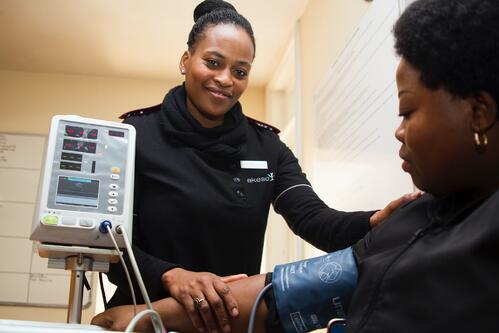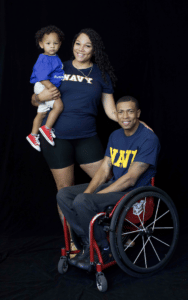Healthcare for Women Veterans: A Strong Step Forward
Posted By PVA Admin on December 16, 2020
For far too long, women veterans have faced a myriad of challenges when trying to access health care from the VA. The system was designed for men, and has been slow to adapt to the rising number of women in military service.
Women veterans with spinal cord injury and disease encounter further difficulties when trying to access care. Many of our women members report they have experienced problems in accessing treatment within parts of VA and in VA community provided care because they can’t get into the building in the first place, the equipment they need isn’t available, or untrained staff doesn’t know how to use it. This means women veterans may receive substandard care.
These women served in the military and deserve the quality health care they earned in service to our country. That is why PVA is urging the President to sign H.R. 7105, the Johnny Isakson and David P. Roe, M.D. Veterans Health Care and Benefits Improvement Act of 2020.
The bill will improve quality of life for all veterans, their families, and caregivers. Specifically, this legislation includes provisions from the Deborah Sampson Act, which strives to improve health care and benefits for women veterans and addresses specific issues unique to those with disabilities.
PVA is especially delighted to see that there will be a requirement for an annual report on women’s health to Congress. One aspect of that report includes an assessment of wheelchair accessibility of women’s health centers in the VA system of care that will address the physical accessibility of every treatment provided at the center and the facilities themselves, including door sizes, equipment, and hoists. In addition, the creation of an Office of Women’s Health in the VA will ensure all facilities across the U.S. are of high quality, have a direct chain of command, and are held accountable.
 PVA National Vice President and U.S. Air Force Veteran Tammy Jones has been a quadriplegic since she was 19 years old. Now in her early fifties, she has experienced a wide range of issues accessing VA care over the years. She was once left waiting for almost half an hour in the rain outside of a VA women’s clinic due to lack of an automatic door opener. She wasn’t even able to flag down the receptionist because the desk was too high for the receptionist to see her. Once she finally was able to get inside, the staff didn’t know how to use the equipment to get her onto the exam table – so she had to reschedule her appointment.
PVA National Vice President and U.S. Air Force Veteran Tammy Jones has been a quadriplegic since she was 19 years old. Now in her early fifties, she has experienced a wide range of issues accessing VA care over the years. She was once left waiting for almost half an hour in the rain outside of a VA women’s clinic due to lack of an automatic door opener. She wasn’t even able to flag down the receptionist because the desk was too high for the receptionist to see her. Once she finally was able to get inside, the staff didn’t know how to use the equipment to get her onto the exam table – so she had to reschedule her appointment.
At other times, she was seen by male doctors who were too uncomfortable or were intimidated to treat her. It took almost a decade for her to find a mental health counselor she was comfortable with.
Tammy currently serves on PVA’s Anita Bloom Women Veterans Committee and has fought hard to see these Deborah Sampson Act provisions passed, including meeting with Rep. Julia Brownley, Chairwoman of the House Veterans’ Affairs Subcommittee on Health and Chair of the House Women Veterans Task Force, as well as attending task force meetings and roundtables with other veterans service organizations.
“This is a very strong start when it comes to the VA addressing the issues of women veterans,” Tammy says. “Research needs to continue into the specific needs of paralyzed and disabled female veterans, and these needs should be addressed with as much intention and focus as they have been for men.”
H.R. 7105 will focus on the following relating to women’s healthcare:
- Eliminate barriers to care and services that many women veterans encounter so they won’t face barriers when trying to get needed care;
- Create an Office of Women’s Health in the VHA to oversee women’s health programs, and create call centers for women veterans;
- Require VA to prioritize retrofitting VA facilities to enhance privacy and improve the environment of care for women veterans;
- Increase the number of gender-specific providers in VA facilities;
- Expand VA Military Sexual Trauma counseling to treat physical health and address intimate partner violence through various means.
- Require VA to create anti-harassment and anti-sexual assault policies, including allowing veterans a choice in the gender of a medical provider if they are a victim of such trauma;
- Improve the quality of care for infant children of women veterans by increasing the number of days of maternity care VA facilities can provide.
“Ultimately, our goal is to improve the quality of care and benefits our women veterans deserve, so they can lead more independent lives – and I will fight for this as long as it takes to make sure the voice of every veteran is heard.”

